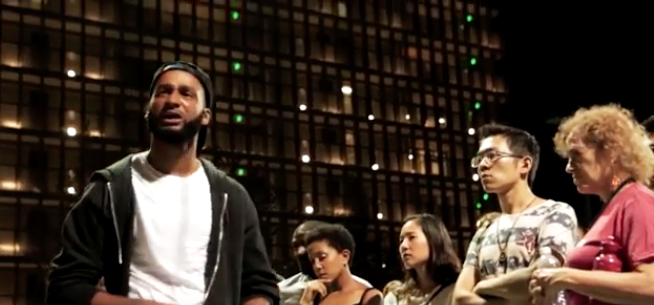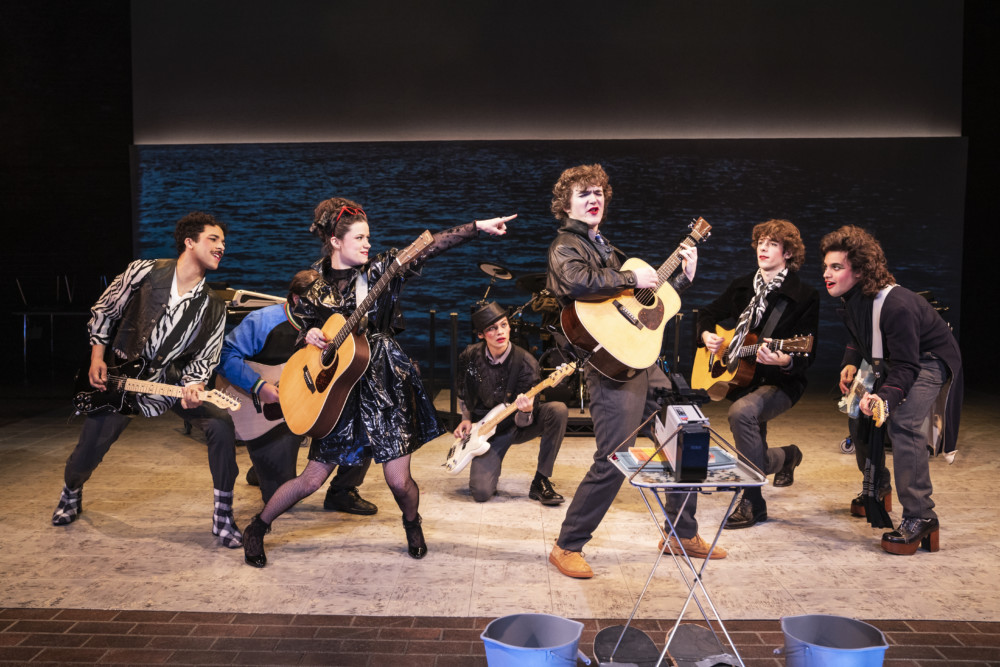by Carol Rocamora
Powerful personal stories are filling the stages at the Public Theatre’s Under the Radar Festival this month. Whether they come from Syria, Japan, Belarus, or the US – whether they are joyous or tragic – they are genuine and arresting, and captivate us with their urgency and universality.
The Bitter Game is the title of Keith Wallace’s compelling show about being black in white America – and surviving. An actor, a basketball, and an empty stage are all that’s needed to generate the kind of passion and heart that this show does. From the moment you walk into the intimate Anspacher Theatre at the Public, you’re greeted by this warm, welcoming performer, hugging many audience members, chatting with others, and radiating energy. Then the house lights go down, and Wallace begins to narrate five short stories of growing up on the mean streets of North Philadelphia.
In the first scene, he’s an eight-year old boy, mingling with his neighbors at a block party on a happy, hot summer’s day that is suddenly shattered by a gunshot – a harbinger of what’s to come. In the second scene, he’s a mother lecturing her nine-year old son on how to survive on the North Philly streets. “For you out here, every day is a war,” she warns him, “So sometimes you got to be as small as you can. Just disappear.”
In the third, devastating story, he’s a young man driving a rental car on his way to his mother’s surprise birthday party. He’s stopped by a policeman, and the scene soon escalates into conflict and ultimate humiliation. In the fourth, he’s a grieving father, burying his son (a junior at Vassar College) who was shot by the police while reaching for his cell phone. In the fifth and final scene, he’s a “homey,” standing on that North Philly street where the stories began, looking back on the injustice of it all.
The thrill of the evening lies in Wallace’s charisma and commitment. He engages us, makes us laugh, passes out candy, and tosses the ball to us – as his stories escalate in gravity and violence. At one point he asks us to chant “Jamel Smith, Jamel Smith” over and over, so that we’ll never forget the name of that innocent Vassar student whose life was so needlessly and cruelly cut short. “Hey, white people, we don’t need pity – what we need is action! Enough is enough!” cries the narrator of the final scene. The Bitter Game is a powerful piece of political theatre – one we won’t forget for its timeliness and its searing truths.
“All my life I’ve been waiting for you” – goes the opening song to Hundred Days, Abigail and Shaun Bengson’s tender tale of how they met and married. What makes this ordinary story so special is its emotional depth, as well as the original music to which it’s set. Backed up by an eager ensemble of musicians, the Bengson’s tale begins when they meet and instantly fall in love. But Abigail is haunted by a prophetic dream she’s had for years – that the love of her life would die one hundred days after they met. Similarly, Shaun is plagued by fears that Abigail would leave him.
So they commit to live the next hundred days as if it were a lifetime. “The years go by and we touch each moment as it floats by,” they sing, in their tuneful folk rock score. (Shaun plays guitar and accompanies Abigail, a powerful vocalist with a Joplinesque style). As dozens of Andrew Hungerford’s tiny lights float above them (ethereal symbols of hope and endurance), they sing a touching ballad of true love – its joys, fears, and ultimate triumphs.
The Bitter Game, created and performed by Keith Wallace, directed and co-created by Deborah Stein; Hundred Days, conceived by Abigail and Shaun Bengson, directed by Anne Kauffman – at the Public Theatre through January 15. www.publictheater.org
























